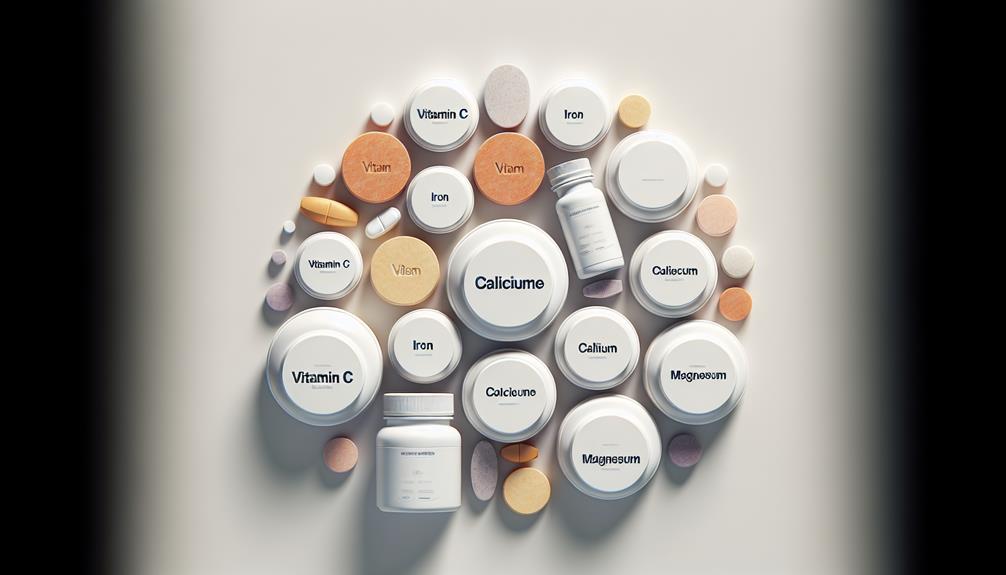Unlock the door to optimal health and well-being by exploring the world of top vitamin and mineral supplements. As you navigate through the vast array of options available, you'll discover essential insights into which nutrients are crucial for your body's functioning.
From the immunity-boosting powers of Vitamin C to the bone-strengthening benefits of Calcium, each supplement plays a unique role in supporting your overall health. But what about the lesser-known minerals that could be the missing piece in your wellness puzzle?
Stay tuned to unravel the secrets behind these hidden gems and pave your way towards a healthier you.
Key Takeaways
- Vitamin D supports bone health and immune function, primarily obtained from sunlight.
- Vitamin C aids tissue growth, immune function, and reduces cold severity.
- Iron prevents anemia and fatigue, found in red meat and greens.
- Zinc is crucial for immune function, wound healing, and common cold duration.
Benefits of Vitamin D
Discover the essential benefits of Vitamin D for your overall health and wellbeing.
Vitamin D is crucial for maintaining optimal bone health as it plays a significant role in calcium absorption. Adequate levels of vitamin D not only support bone strength but also contribute to proper immune function, reducing the risk of infections.
Deficiency in vitamin D has been linked to an increased susceptibility to osteoporosis and various chronic diseases. Sunlight exposure is a primary source of vitamin D production in your body, making it essential to spend time outdoors.
While fatty fish, fortified dairy products, and eggs are food sources of vitamin D, supplementation may be necessary for many individuals, especially those with limited sun exposure or specific dietary restrictions.
Ensuring you have sufficient vitamin D levels is essential for a strong skeleton, robust immune system, and overall well-being.
Importance of Vitamin C
Ensuring an adequate intake of Vitamin C is crucial for supporting the growth, repair, and overall health of your body tissues. Vitamin C is a powerful antioxidant that plays a key role in protecting your cells from damage caused by free radicals. In addition to its antioxidant properties, vitamin C is essential for the effective functioning of your immune system. Incorporating vitamin C-rich foods or supplements into your diet can provide the immune support your body needs to stay healthy.
Citrus fruits like oranges and grapefruits, as well as strawberries, kiwi, bell peppers, and broccoli, are excellent sources of vitamin C. These foods can help you meet your daily vitamin C requirements and reap the benefits it offers for your health. Adequate intake of vitamin C has also been shown to reduce the duration and severity of colds, making it a valuable nutrient to prioritize in your diet. Remember to include vitamin C-rich foods regularly to support your overall well-being.
Role of Iron in Health

Iron plays a crucial role in maintaining optimal health by facilitating the transport of oxygen in the blood. This essential mineral is vital for preventing anemia, fatigue, weakness, and supporting cognitive function.
Good food sources of iron include red meat, poultry, seafood, beans, and dark leafy greens. In cases of iron deficiency, healthcare providers may recommend iron supplements to address the deficiency and improve overall health. However, it's important to be cautious as too much iron can have adverse effects.
Consulting a healthcare provider before starting iron supplements is crucial to ensure you're taking the correct dosage. By regulating the levels of iron in your body, you can support proper blood oxygen transport, which is essential for maintaining energy levels and cognitive function. Remember, balance is key when it comes to iron intake for optimal health.
Benefits of Magnesium
Magnesium's essential role in over 300 biochemical reactions highlights its significance in maintaining optimal health and function throughout your body. Adequate magnesium intake is crucial for supporting bone health, heart health, and blood sugar regulation.
Without enough magnesium, you may experience symptoms such as muscle cramps, fatigue, and abnormal heart rhythms due to deficiency. To ensure you meet your daily magnesium requirements, include magnesium-rich foods like nuts, seeds, whole grains, and leafy green vegetables in your diet.
In some cases, especially if you have certain medical conditions or dietary restrictions, magnesium supplements may be beneficial. By incorporating magnesium into your daily routine, you can help support your body's energy production, muscle function, and overall well-being.
Impact of Zinc on Wellness

Zinc significantly contributes to overall wellness by playing a crucial role in immune function and wound healing. As an essential mineral, zinc is vital for maintaining a healthy immune system and aiding in the body's ability to fight off infections.
A deficiency in zinc can lead to impaired immune function, making you more susceptible to illnesses and causing delays in wound healing. Zinc supplementation has shown promise in reducing the severity and duration of the common cold, especially when taken at the onset of symptoms.
Including foods rich in zinc such as oysters, red meat, poultry, beans, nuts, and whole grains in your diet can help ensure you meet your daily zinc requirements. By supporting your immune system and promoting efficient wound healing, zinc plays a crucial role in keeping you healthy and resilient against infections.
Frequently Asked Questions
What Are Some Concerns About Vitamin and Mineral Supplements?
Be cautious with vitamin and mineral supplements. Excessive intake can harm your health. Consult healthcare professionals before taking high doses. Mega-doses don't cure diseases. Studies show minimal benefits. Your safety matters; don't risk it.
Should There Be Any Concern When Taking Vitamin or Mineral Supplements?
When taking vitamin or mineral supplements, be cautious about exceeding recommended levels to prevent toxicity. Consult a healthcare provider before starting a new regimen, especially if on medications or with health conditions. Monitor for adverse reactions.
Does Everyone Need to Take Daily Vitamin and Mineral Supplements to Be Healthy?
You don't necessarily need to take daily vitamin and mineral supplements to be healthy. A balanced diet can often provide the nutrients you need. Consider consulting a healthcare provider to determine if supplements are right for you.
Do Vitamin and Mineral Supplements Actually Work?
Yes, vitamin and mineral supplements can work effectively to fill nutrient gaps and support your overall health. Consult with a healthcare provider to determine the right supplements for your needs. Remember, proper use is key.
Conclusion
In conclusion, remember to prioritize a balanced diet for obtaining essential vitamins and minerals.
While supplements can be beneficial, it's crucial to consult healthcare providers before starting any new regimen, especially if on medication.
Stay informed and use reliable sources like the U.S. Department of Agriculture and MyPlate for guidance on maintaining optimal health through proper nutrition.
Your health is worth the effort of making informed choices for your well-being.
I’m not just a supplement analyst. I’m an extremely qualified one! I am a Certified Nutrition Coach (CNC) and actually received my certification directly from the National Academy of Sports Medicine. I am also a Nutrition & Wellness Consultant, certified by the American Fitness Professionals Association (AFPA).


